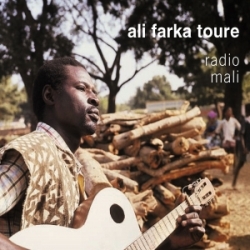Ali Farka Touré - Rádio Mali (1996)
Ali Farka Touré - Rádio Mali (1996)

1. Njarka 2. Yer Mall Gakoyoyo 3. Soko 4. Bandalabourou 5. Machengoidi download 6. Samarya 7. Hani 8. Gambari 9. (hiarka) Gambari 10. Biennal 11. Arsany 12. Amadinin 13. Seygalre 14. Krei Kongo 15. Radio Mali download 16. Njarka (exerpt) Personnel Ali Farka Touré (Vocals 2-12,14-15; Guitar 1-16; Percussion 7) Bra Nabo (n'jarka violin 1,5,16) Nassourou Sare (n'goni 3-4,8,11,13) Fangha (n'jarka violin 5,9) (unknown) (Chorus 6; Percussion 6, n'goni 6)
Previously available as a 1996 import on the World Circuit label, this nearly 72-minute collection of recordings were originally made for radio broadcast between 1970 and 1978. As a single collection, this is the finest yet of Toure's slow-burning music, characterized by nimble, expressive guitar playing and strong, expressive singing. Lyrically, the songs are mostly devotionals, praising a loved one, Allah, and various government initiatives (including Radio Mali itself). Half the tunes feature Toure alone on guitar and vocals; elsewhere he is backed by the ngoni's beautiful rattle-buzz, a full choir, a smattering of percussion, and a violin player whose sliding, high-pitched notes echo the fiddle playing of Appalachia. Throughout, Toure's singing has a wider range than you'd expect (considering that he's known as the "African John Lee Hooker") and his bluesy guitar playing is always melodic, modal, and meditative. Toure repeats musical phrases over and over again, subtly changing them. But he never gets fancy for its own sake--his style (which adapts Sonrai, Peul, and Tamascheq techniques) sounds as natural as a babbling brook. Strands of sing-songy, seemingly simplistic melodies wrap around each other, coming together and unwinding like strands of RNA. This is some mind-blowing stuff. ---Mike McGonigal, Editorial Reviews
The magic of this cd is that it contains Ali's most "traditional African" music. As he says in the liner notes to his cd, NIAFUNKE, for a while his music became Westernized, basically Afro-Pop. Luckily for us, NIAFUNKE and RADIO MALI do not suffer from the Afro-Pop affliction.
This cd is entirely acoustic, as opposed to NIAFUNKE which has him on both acoustic and electric guitars. I want to clear one thing up from the Amazon.com review. The "violin" that is mentioned is the African njarka violin. The njarka is a one-string instrument that is about 9 or 10 inches long. I just don't want anyone thinking of the Western violin. Technically, the njarka is a rather crude instrument but it releases a glorious sound, as if the earth herself is singing. If you ever see Ali in concert (and you really should see him in concert!) you will hear the full emotional power of the njarka in the hands of a master.
Ali is the original musician who translated traditional Malian music to the guitar and then later melded this together with a touch of the blues. He is in great form on this cd. Just by listening you won't know what he is singing about (since he sings in his traditional languages) but this may actually be an advantage. You won't get caught up in analyzing lyrics or stories, you will simply feel him translating his emotions into music.
If you are completely unfamiliar with Ali's music (or any African music at all) then I suggest that NIAFUNKE may be a better choice. It has a bit more of the blues influence than this cd does, and for that reason alone I think it may possibly be a smoother transition into his music for people who are unfamiliar with him. In all honesty though, I'd recommend purchasing both cd's. They show different sides of the same man, are seperated by 2 decades, and both display the full passion and depth of the Malian musical tradition. Ali is an incredible songwriter on both cd's, you don't even need to know specifically what he is singing about to be completely moved by the manner in which he performs his songs. --- Pharoah S. Wail (Inner Space)
download: uploaded anonfiles mega 4shared mixturecloud yandex mediafire download
Zmieniony (Środa, 28 Sierpień 2013 17:10)








